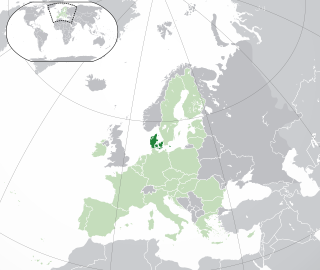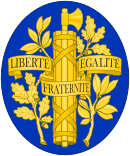
This is a list of referendums related to the European Union, or referendums related to the European Communities, which were predecessors of the European Union. Since 1972, a total of 48 referendums have been held by EU member states, candidate states, and their territories, with several additional referendums held in countries outside the EU. The referendums have been held most commonly on the subject of whether to become a member of European Union as part of the accession process, although the EU does not require any candidate country to hold a referendum to approve membership or as part of treaty ratification. Other EU-related referendums have been held on the adoption of the euro and on participation in other EU-related policies.
A referendum on retaining the monarchy or becoming a republic was held in Norway on 12 and 13 November 1905. Voters were asked whether they approved of the Storting's decision to authorise the government to make the offer of the throne of the newly self-ruling country. The Storting had wanted to offer the throne to Prince Carl of Denmark, but the prince insisted that the Norwegian people have a chance to decide whether they wanted to retain a monarchy.

A constitutional referendum was held in France on 21 October 1945. Voters were asked whether they approved of the Assembly elected on the same day serving as a Constituent Assembly, and whether until a new constitution was approved, the country would be governed according to a proposed set of laws that appeared on the ballot paper. If the first proposal had not been approved, the Third Republic would have been restored, but its approval led to the elected Assembly drafting a constitution and proposing it to the people a year later, resulting in the creation of the Fourth Republic. Both were approved by wide margins with a turnout of 79.8%.

A constitutional referendum was held in France on 5 May 1946. Voters were asked whether they approved of a new draft Constitution proposed by the Constituent Assembly elected in 1945.

A constitutional referendum was held in France on 13 October 1946. Voters were asked whether they approved of a new constitution proposed by the Constituent Assembly elected in June. Unlike the May referendum, which saw a previous constitutional proposal rejected, the new Constitution of 27 October 1946 was accepted by 53.2% of voters, and brought the Fourth Republic into existence. Voter turnout was 67.6%.

A constitutional referendum was held in France on 8 May 1870. Voters were asked whether they approved of the liberal reforms made to the constitution since 1860 and passed by the Sénatus-consulte on 20 April 1870. The changes were approved by 82.7% of voters with an 81.3% turnout. However, France's defeat in the Franco-Prussian War caused the Empire to be abolished later that year. Although this was the ninth constitutional referendum in French history, it was the first to have more than 8% oppose the motion; four of the previous seven had officially gained 99% approval.

A referendum on re-establishing the Empire was held in France on 21 and 22 November 1852. Voters were asked whether they approved of the re-establishment of the Empire in the person of Louis Napoléon Bonaparte and family. It was approved by 96.9% of voters with a 79.8% turnout.
A referendum was held in France on 20 and 21 December 1851. Voters were asked whether they approved of the continuation of the authority of Louis Napoléon Bonaparte and to delegate the powers required to produce a new constitution. It was approved by 92% of voters with an 81.7% turnout.

A non-binding referendum on the Single European Act was held in Denmark on 27 February 1986. It was approved by 56.2% of voters, with a voter participation of 75.4%.
A constitutional referendum was held in Denmark on 23 May 1939. Voters were asked whether they approved of a new constitution. Although it was approved by 91.9% of those who voted, a turnout of only 48.9% meant that the percentage of eligible voters approving it was only 44.46%, below the 45% required by the existing constitution of 1915.
A constitutional referendum was held in Denmark on 6 September 1920. It was held in order to make changes to the constitution of Denmark from 1915 that had been made necessary to facilitate the reunification of Southern Jutland into the kingdom of Denmark. The changes were approved by 96.9% of voters, with a 49.6% turnout. A total of 614,227 of the 1,291,745 registered voters voted in favour, meaning that 47.6% of eligible voters had voted for the proposals, above the 45% required by the constitution.
A constitutional referendum was held in Iceland between 20 and 23 May 1944. The 1 December 1918 Danish–Icelandic Act of Union had granted Iceland independence from Denmark, but maintained the two countries in a personal union, with the King of Denmark also being the King of Iceland. In the two-part referendum, voters were asked whether the Union with Denmark should be abolished, and whether to adopt a new republican constitution. Both measures were approved, each with more than 98% in favour. Voter turnout was 98.4% overall, and 100% in two constituencies, Seyðisfirði and Vestur-Skaftafjellssýsla.
A referendum on the Act of Union with the Kingdom of Denmark was held in Iceland on 19 October 1918. Voters were asked whether they approved of the Act, which would lead to Iceland becoming a separate kingdom under the Danish Crown, making the country a sovereign state in a personal union with Denmark. It was approved by 92.6% of voters.
A referendum on community service was held in Iceland on 21 October 1916. Voters were asked whether they approved of introduction of compulsory community service. It was rejected by 91.8% of voters.
A four-part referendum was held in Switzerland on 11 May 1884. All four were rejected by voters.
Two referendums were held in Switzerland in 1887. The first was held on 15 May, asking voters whether they approved of a federal law on spirits, and was approved by 65.9% of voters. The second was held on 10 July, asking voters whether they approved of an amendment made to article 64 of the federal constitution, and was approved by 77.9% of voters and 20.5 cantons.
A referendum on the armed forces was held in Switzerland on 3 November 1907. Voters were asked whether they approved of the organisation of the federal armed forces. The proposal was approved by 55.2% of voters.

Denmark in the European Union refers to the historical and current issues of Denmark's membership in the European Union (EU). Denmark has a permanent representation to the EU in Brussels, led by ambassador Jonas Bering Liisberg.

The Treaty of Accession 1972 was the international agreement which provided for the accession of Denmark, Ireland, Norway and the United Kingdom to the European Communities. Norway did not ratify the treaty after it was rejected in a referendum held in September 1972. The treaty was ratified by Denmark, Ireland and the United Kingdom who became EC member states on 1 January 1973 when the treaty entered into force. The treaty remains an integral part of the constitutional basis of the European Union.

The 1973 enlargement of the European Communities was the first enlargement of the European Communities (EC), now the European Union (EU). Denmark, Ireland and the United Kingdom (UK) acceded to the EC on 1 January 1973. Gibraltar and Greenland also joined the EC as part of the United Kingdom and Denmark respectively, but the Danish Faroe Islands, the other British Overseas Territories and the Crown dependencies of the United Kingdom did not join the EC.






